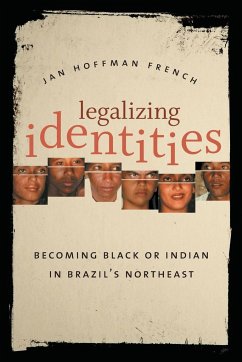Anthropologists widely agree that identities--even ethnic and racial ones--are socially constructed. Less understood are the processes by which social identities are conceived and developed. Legalizing Identities shows how law can successfully serve as the impetus for the transformation of cultural practices and collective identity. Through ethnographic, historical, and legal analysis of successful claims to land by two neighboring black communities in the backlands of northeastern Brazil, Jan Hoffman French demonstrates how these two communities have come to distinguish themselves from each other while revising and retelling their histories and present-day stories. French argues that the invocation of laws by these related communities led to the emergence of two different identities: one indigenous (Xoco Indian) and the other quilombo (descendants of a fugitive African slave community). With the help of the Catholic Church, government officials, lawyers, anthropologists, and activists, each community won government recognition and land rights, and displaced elite landowners. This was accomplished even though anthropologists called upon to assess the validity of their claims recognized that their identities were "constructed." The positive outcome of their claims demonstrates that authenticity is not a prerequisite for identity. French draws from this insight a more sweeping conclusion that, far from being evidence of inauthenticity, processes of construction form the basis of all identities and may have important consequences for social justice.
Bitte wählen Sie Ihr Anliegen aus.
Rechnungen
Retourenschein anfordern
Bestellstatus
Storno








